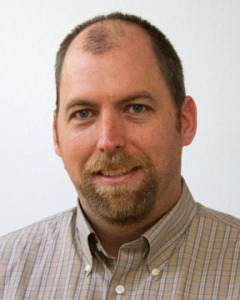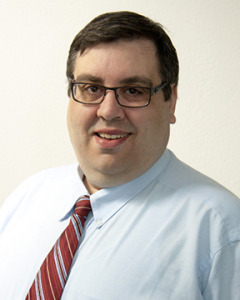Posted 2:40 p.m. Monday, Oct. 27, 2014
Two professors will use mathematical models to determine if humanity could survive an attack from the undead.
 James Peirce[/caption]
As Halloween night nears, two UW-L professors are teaming up to ponder the end of a classic, fiction horror plot.
Robert Allen and James Peirce, Mathematics, will use mathematical models to determine if humanity could survive an attack from the undead. Their talk “Zombies, Vampires and Math, Oh My” will be at 7 p.m. Thursday, Oct. 30, in Cowley Hall 100. All are welcome and no prior math knowledge is required to attend. The presentation aims to blend horror, humor, math and science. Costumes are encouraged and prizes will be awarded for the best costumes.
Allen and Peirce will start by digging into the classic horror plot where one zombie enters the human population, bites someone, and that person in turn bites others — turning more and more people into zombies. The winner — humans or zombies — is determined by assumptions that shape the equations used. In particular, it depends on the reaction of the human population to stop the undead. Allen and Peirce will describe the situation using differential equations and summarize the outcomes on computer-generated graphs.
[caption id="attachment_37342" align="alignright" width="240"]
James Peirce[/caption]
As Halloween night nears, two UW-L professors are teaming up to ponder the end of a classic, fiction horror plot.
Robert Allen and James Peirce, Mathematics, will use mathematical models to determine if humanity could survive an attack from the undead. Their talk “Zombies, Vampires and Math, Oh My” will be at 7 p.m. Thursday, Oct. 30, in Cowley Hall 100. All are welcome and no prior math knowledge is required to attend. The presentation aims to blend horror, humor, math and science. Costumes are encouraged and prizes will be awarded for the best costumes.
Allen and Peirce will start by digging into the classic horror plot where one zombie enters the human population, bites someone, and that person in turn bites others — turning more and more people into zombies. The winner — humans or zombies — is determined by assumptions that shape the equations used. In particular, it depends on the reaction of the human population to stop the undead. Allen and Peirce will describe the situation using differential equations and summarize the outcomes on computer-generated graphs.
[caption id="attachment_37342" align="alignright" width="240"] Robert Allen[/caption]
While a zombie outbreak is a popular plot, the problem is not entirely fiction. It is a paradigm for the spread of infectious disease — something of particular intrigue today as the number of cases of Ebola continues to rise. The end of their talk will delve into how diseases spread through a population.
They’ll also explore a similar scenario where Vampires attempt to overtake the human population. This problem reflects predator and prey interactions in nature, and mathematical models can be used in animal conservation efforts.
Peirce’s own research involves creating mathematical models for how a parasite works through a snail host to get into the waterfowl population in Lake Onalaska. It’s a local concern since the parasite is causing death in a large number of migrating birds.
“We love math, and we think it’s important,” says Peirce. “It’s not just for solving equations for x or balancing checkbooks. It has these wonderful applications, especially for disciplines outside of mathematics.”
Robert Allen[/caption]
While a zombie outbreak is a popular plot, the problem is not entirely fiction. It is a paradigm for the spread of infectious disease — something of particular intrigue today as the number of cases of Ebola continues to rise. The end of their talk will delve into how diseases spread through a population.
They’ll also explore a similar scenario where Vampires attempt to overtake the human population. This problem reflects predator and prey interactions in nature, and mathematical models can be used in animal conservation efforts.
Peirce’s own research involves creating mathematical models for how a parasite works through a snail host to get into the waterfowl population in Lake Onalaska. It’s a local concern since the parasite is causing death in a large number of migrating birds.
“We love math, and we think it’s important,” says Peirce. “It’s not just for solving equations for x or balancing checkbooks. It has these wonderful applications, especially for disciplines outside of mathematics.”
